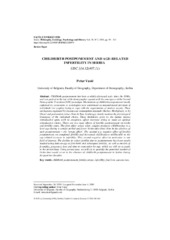| dc.creator | Vasić, Petar | |
| dc.date.accessioned | 2023-06-09T10:11:32Z | |
| dc.date.available | 2023-06-09T10:11:32Z | |
| dc.date.issued | 2021 | |
| dc.identifier.issn | 1820-8495 | |
| dc.identifier.uri | http://gery.gef.bg.ac.rs/handle/123456789/1301 | |
| dc.description.abstract | Childbirth postponement has been a widely discussed topic since the 1990s, and was pushed to the top of the demographic agenda with the emergence of the Second Demographic Transition (SDT) paradigm. Mechanisms of childbirth postponement mostly explained by economists or sociologists were understood as rational-based decisions of individuals (or couples) trying to cope with the requirements of modern society. These mechanisms explained by income and consumption rationale (Becker, Modigliani), or by liberal and postmodern values (Van de Kaa, Lestheage), barely mention the physiological limitations of the individual choice. These limitations given by the human species reproductive span, with no exception, affect everyone trying to make an optimal reproductive choice. There are two main effects of fertility postponement on births and fertility rates. The first effect arises when couples postpone childbearing to a later age during a certain period and fewer births take place than in the absence of such postponement – the ‘tempo effect’. The second is a negative effect of fertility postponement on completed fertility and increased childlessness attributable to the age-related increase in infertility. This second negative effect in particular is our field of interest. The decline in cohort fertility due to postponement has been mostly studied using data on age at first birth and subsequent fertility, as well as models of fecundity, pregnancy loss and time to conception by age, which we will try to apply to the period data. Using period data, we will try to quantify the potential number of births that would occur in the absence of childbirth postponement in Serbia during the past two decades. | sr |
| dc.language.iso | en | sr |
| dc.publisher | University of Niš | sr |
| dc.relation | info:eu-repo/grantAgreement/MESTD/Integrated and Interdisciplinary Research (IIR or III)/47006/RS// | sr |
| dc.rights | openAccess | sr |
| dc.rights.uri | https://creativecommons.org/licenses/by-nc-nd/4.0/ | |
| dc.source | Facta Universitatis - Series: Philosophy, Sociology, Psychology and History | sr |
| dc.subject | childbirth postponement | sr |
| dc.subject | fertility tempo | sr |
| dc.subject | infertility | sr |
| dc.subject | fetal loss | sr |
| dc.subject | success rate | sr |
| dc.title | Childbirth postponement and age-relatetd infertility in Serbia | sr |
| dc.type | article | sr |
| dc.rights.license | BY-NC-ND | sr |
| dcterms.abstract | Васић, Петар; | |
| dc.citation.volume | 20 | |
| dc.citation.issue | 2 | |
| dc.citation.spage | 97 | |
| dc.citation.epage | 111 | |
| dc.citation.rank | M51 | |
| dc.identifier.doi | 10.22190/FUPSPH2102097V | |
| dc.identifier.fulltext | http://gery.gef.bg.ac.rs/bitstream/id/2812/bitstream_2812.pdf | |
| dc.type.version | publishedVersion | sr |


